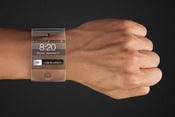Microsoft Surface Smartwatch Would Test ReorgMicrosoft Surface Smartwatch Would Test Reorg
According to latest rumors, Microsoft's smartwatch is now in hands of Surface team and will run a version of Windows 8. It could also test Ballmer's reorg vision.


Apple iWatch Vs. Smartwatches Past And Present
Apple iWatch Vs. Smartwatches Past And Present(click image for larger view and for slideshow)
Last week, Microsoft CEO Steve Ballmer reorganized the company to better facilitate his "devices and services" vision.
Now that the company's new leadership is in place, Microsoft is reportedly charging forward with one of the devices to which Ballmer is ostensibly referring: a smartwatch.
The product, which Microsoft has yet to confirm, would presumably fall under the purview of Julie Larson-Green, who previously co-ran Windows and is now responsible for the newly-formed Devices and Studio division. The division includes not only Surface products but also Xbox games and hardware.
According to rumors, Apple, Samsung and many others are developing similar smartwatch devices. It's assumed many of these companies will attempt to leverage existing mobile customers by pitching the devices as companions to smartphones and tablets. Compared to direct competitors, Microsoft's base of mobile users is relatively small, a potential disadvantage that Larson-Green will have to manage.
[ What does Sony's second-generation smartwatch offer? Read Sony Enters Phablet Fray, Debuts New SmartWatch. ]
The buzz around a Microsoft smartwatch has been building for weeks. In April, The Wall Street Journal reported that the company was sourcing components for the device, which is rumored to have a 1.5-inch touchscreen. The Verge later reported that the device might use the same power connecter as Microsoft's Surface tablets.
On July 12, the website Among Tech, citing unidentified sources, reported that Microsoft's smartwatch work has been moved from the Xbox team to the Surface team. The site claims the device will use removable wrist bands that will be available in a variety of colors, and that the main unit will be made from an aluminum that is 80% transparent but much stronger than glass. The device will reportedly support 4G LTE and rely on the cloud, but it will also include 6 GB of local storage, most of which will be devoured by the OS.
The Verge's unnamed sources subsequently confirmed that the smartwatch program is now directly under the Surface team. The site reported that a prototype has been built, and that it will run a modified version of Windows 8. Although it remains to be seen when or if Microsoft will bring a smartwatch to market, any eventual product would test the muster of Steve Ballmer's new management hierarchy.
Wearable technology is a nascent market, still typified by curiosities such as Google Glass rather than breakthrough products such as the iPad. Given that the Kickstarter-backed Pebble is arguably the smartwatch segment's poster child, it's easy to see why Microsoft, Apple and other large companies sense an opportunity.
Even so, if Microsoft releases a Surface watch, its goal will be to grow the larger Windows 8 ecosystem. For Apple, the iPod and iTunes became a gateway to iOS and, to a lesser extent, OS X. For Microsoft, a smartwatch might not need to succeed on the iPod's scale, but Ballmer no doubt hopes to mimic the strategy.
With competitors already in the background, however, Microsoft faces challenges. Android and iOS each have close to a million mobile apps that a watch might connect to. They also have legions of developers who can use their existing skills to build new apps suited for a wearable device. Whether these apps will be worthwhile is anyone's guess. But it's an advantage Microsoft doesn't have.
As a result, Julie Larson-Green will need to shepherd a product that will hit the ground running. The Windows 8 ecosystem is improving, and its progress will likely accelerate once Windows 8.1 is officially released. But on the mobile and consumer scenes, Microsoft will have to accelerate for a long time before it catches up to Apple, Google and Samsung. If Microsoft can't launch a smartwatch with more success than its poor-selling Surface tablets have had, it will only fall farther behind.
In that regard, the reported LTE support is interesting. Whereas some smartwatches must connect to a smartphone for data, the rumor suggests the Surface watch will have its own data plan. In a way, this approach could be a customer deterrent; many people already pay data bills for smartphones and tablets, so to convince consumers to add another expense, a Windows-powered smartwatch will need to be compelling.
Then again, LTE support also suggests that the watch could have standalone apps that don't require other devices. This is probably a good move. In relative terms, there aren't that many Windows Phone 8 users, after all, so if a Surface smartwatch appealed only to those with compatible phones, Microsoft would be limiting itself.
Still, in addition to appealing on its own account, the device will also need to enhance other Windows products, meaning that Larson-Green's team will have to work closely with the software teams. Tweaking Windows 8.1 for a 1.5-inch screen is no small task, and the Surface watch will only succeed if it is a compelling fusion of hardware, an engaging user interface, solid native apps and connectivity to other devices.
If Ballmer's reorg succeeds in making the company culture more collaborative and focused, the smartwatch could live up to these requirements. If not, the smartwatch could be the wearable equivalent of the Surface Pro -- interesting on paper but a niche product in practice -- or, even worse, the Zune media player.
Read more about:
2013About the Author
You May Also Like






